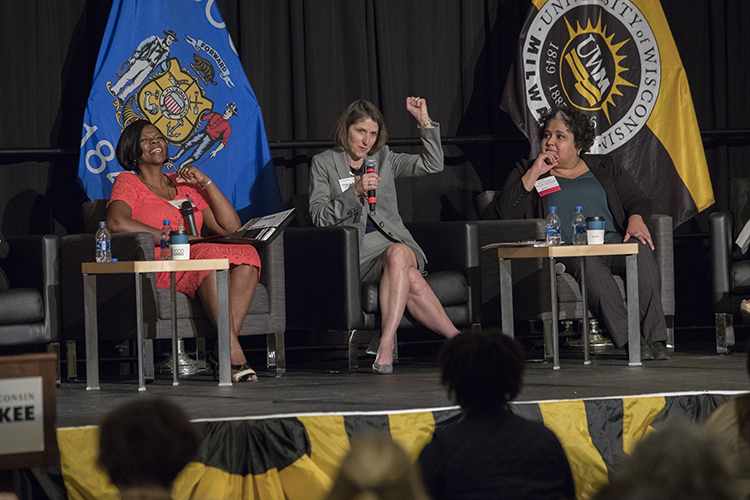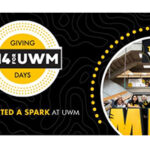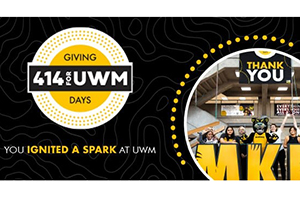For Margaret Daun, the trait that made her successful is also one that could be a disadvantage.
“I have absolute dogged passion for everything I do,” said Daun, chief corporation counsel for Milwaukee County. “As I have moved through my career, my dogged passion can turn people off, imagine that.”
It was a common theme expressed by the panelists at a women’s leadership conference at UWM on Aug. 14. The conference, “Leaders Converse: Empowering Your Voice,” featured a discussion among seven female leaders in Wisconsin, moderated by Lt. Gov. Rebecca Kleefisch.
Picking up on Daun’s comment, Kleefisch asked who had had similar experiences. All the panelists raised their hands.
“How do you deal with that?” Kleefisch asked.
Sarah Alt, the founder and president of Triple Ten Consulting, did not seem fazed.
“Sometimes I lead jokingly with ‘I’m just trying to fit in,’ because in my profession I’m usually the only woman in the room when talking about the technology profession or the STEM field,” Alt said.
Being a bold leader
Kleefisch referenced research written about in the Harvard Business Review that explored whether women or men are bolder leaders. Even though men are thought to be bolder, it was women who were found to rank higher in the boldness index.
This research informed her next few questions about how being bold and taking risks have spurred the women’s career success.
“Boldness is rooted in confidence,” said Karen Nelson, diversity and inclusion coordinator of City of Appleton. “People focus on the confidence, which helps me focus on delivering what I need to share.”
Michelle Friedman, director of marketing at DeWitt, Ross and Stevens, recalled her service in the United States military as an Arabic translator. In 1995, Friedman was selected to participate in the world’s largest joint military exercise in Cairo, Egypt. Her job was to translate reports on all military operations from English to Arabic, then brief the highest-level officers each day.
“When I got up to the podium I was prepared,” Friedman said. “What I wasn’t prepared for as a 23-year-old was standing at the podium, looking out at the audience that’s twice this size and not seeing one other woman in the room.”
The panelists considered matters of equity and equality in the workplace, and all seemed positive about it getting better but agreed that much work needs to be done.
‘I can do this’
Wisconsin Rep. JoCasta Zamarripa talked about working with the nonprofit organization Emerge Wisconsin, which trains women to run for elected office.
“I would say the act of a woman standing up and saying, ‘I can do this, I can run for office,’ is such a bold move,” Zamarripa said. “We are still only about 20 percent of women in state legislatures across the country.”
Daun pointed to a similar issue in corporate America.
“In the law, there is a real and fundamental dilemma —more than half of the folks in law schools and graduating law schools are women, and we see similar pairings in MBA programs,” Daun said. “Yet, we know corporate boardrooms are dominated by men, partnerships at the largest law firms are dominated by men, especially white men.”
Daun and Peggy C. Kelsey, executive vice president and general counsel of WEC Energy Group, are working together to increase the diversity of the lawyers in the largest law firms in Milwaukee.
“We are using our voices there to make a difference,” said Kelsey.
Traits of a good leader
A large part of the panel discussion focused on traits that make for a good manager and leader. The first questions asked were “Can you all share a story from your own life where your strong traits lead to your career progression? And are there some traits more important to focus on?”
“I think understanding the market, understanding the timing is key, and critical for succession planning when you’re a business owner,” said Jennifer Hansen, who has worked with plastics for manufacturing for over 25 years and is president and owner of the Anderson Group.
Hansen purchased her father’s seal distribution company in 2003, expanding it from six employees to 80. In 2016, she sold part of the company to the Sweden-based Trelleborg Sealing Solutions and stayed on to manage it.
The conference was sponsored by the Lubar School of Business Executive MBA program, Lubar Executive Programs, the Division of Student Affairs and two student organizations, PantherHacks and Executives in Pink.







